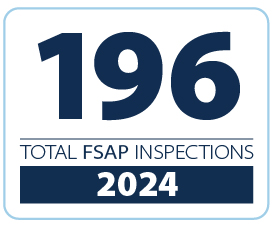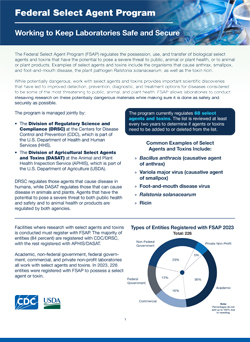About Us
The Federal Select Agent Program (FSAP) regulates the possession, use, and transfer of biological select agents and toxins that have the potential to pose a severe threat to public, animal or plant health, or to animal or plant products. Examples of select agents and toxins include the organisms that cause anthrax, smallpox, and foot-and-mouth disease, the plant pathogen Ralstonia solanacearum, as well as the toxin ricin.
While potentially dangerous, work with select agents and toxins provides important scientific discoveries that have led to improved detection, prevention, diagnostic, and treatment options for diseases considered to be some of the most threatening to public, animal, and plant health. FSAP allows laboratories to conduct lifesaving research on these potentially dangerous materials while making sure it is done as safely and securely as possible.
The program is managed jointly by:
- The Division of Regulatory Science and Compliance (DRSC) at the Centers for Disease Control and Prevention (CDC), which is part of the U.S. Department of Health and Human Services (HHS).
- The Division of Agricultural Select Agents and Toxins (DASAT) at the Animal and Plant Health Inspection Service (APHIS), which is part of the U.S. Department of Agriculture (USDA).
DRSC regulates those agents that cause disease in humans, while DASAT regulates those that can cause disease in animals and plants. Agents that have the potential to pose a severe threat to both public health and safety and to animal health or products are regulated by both agencies.
The program currently regulates 63 select agents and toxins. The list is reviewed at least every two years to determine if agents or toxins need to be added to or deleted from the list.
Facilities where research with select agents and toxins is conducted must register with FSAP. The majority of entities (84 percent) are registered with CDC/DRSC, with the rest registered with APHIS/DASAT.
Academic, non-federal government, federal government, commercial, and private non-profit laboratories all work with select agents and toxins. In 2024, 230 entities were registered with FSAP to possess a select agent or toxin.
- Bacillus anthracis (causative agent of anthrax)
- Variola major virus (causative agent of smallpox)
- Foot-and-mouth disease virus
- Ralstonia solanacearum
- Ricin
Types of Entities Registered with FSAP, 2024
Total: 230

A Brief History
1995
A microbiologist was arrested and convicted of mail and wire fraud after misrepresenting the reasons for purchasing three vials of Yersinia pestis (the bacterium that causes plague)
1996
Congress passed Section 511 of the Antiterrorism and Effective Death Penalty Act of 1996 to address concerns about how easy it was to legally obtain biological agents that could cause disease in humans. The Act required HHS to:
- Establish a list of biological agents and toxins that could threaten public health and safety (select agents)
- Register entities and identify procedures for governing the transfer of those agents
- Create safety requirements for registered entities connected to the transfer of those agents
HHS delegated this authority to CDC
2001-2002
After five people died from the anthrax attacks of 2001, Congress passed:
- The USA PATRIOT Act in 2001, which established criteria for those prohibited from having access to select agents and toxins
- The Public Health Security and Bioterrorism Preparedness and Response Act of 2002, which required HHS and USDA to publish regulations to strengthen oversight of select agents and toxins that have the potential to pose a severe threat to public health – as well as to animal and plant health, or to animal and plant products
2010
President Obama signed Executive Order 13546, which called for:
- A review to prioritize (or “tier”) the riskiest agents and toxins
- Consider reducing the number of agents and toxins on the list
- Establishing physical security standards for select agents and toxins that present the greatest risk of deliberate misuse with significant potential for mass casualties or devastating effects on the economy, critical infrastructure, or public confidence
2012
A regulatory amendment was published to establish “Tier 1” agents, or those that represent the greatest risk of deliberate misuse with the most significant potential for mass casualties, devastating effects on the economy, critical infrastructure, or public confidence
Key Regulatory Functions and Activities
Develops, implements, and enforces the select agent regulations[1]
The regulations outline key requirements that entities must meet in order to work with select agents and toxins, including local oversight, biosafety, security, reporting, and training needs, among others.
Provides oversight of possession
A national database enables the U.S. government to be aware of entities that possess these potentially dangerous materials. This registry allows FSAP to proactively reach out to entities in advance of natural disasters or other national events to ensure all select agents and toxins are properly secured. In addition, the program tracks identification of select agents or toxins in diagnostic materials, and monitors the transfer of these materials to ensure they are housed at safe, secure facilities.

Conducts inspections and approves registrations
FSAP makes sure that appropriate measures are in place at each registered entity to prevent the unauthorized access, theft, loss, or release of select agents and toxins. The program approves registration applications for facilities and conducts periodic inspections of approved entities. Inspections also help ensure that entities comply with the select agent regulations, and that any serious biosafety or security concerns are identified and remedied as quickly as possible. Entities may be informed of inspections ahead of time or they may be unannounced. Inspections are led by either DRSC or DASAT, depending on which agents and toxins the entity is registered to possess, use, or transfer.
Approves individual access to select agents and toxins
An individual who works with select agents and toxins must first undergo a security risk assessment performed by the FBI’s Criminal Justice Information Services Division. This helps prevent bioterrorists or others who may wish to misuse the agents from accessing these agents and toxins.
Receives reports of theft, loss, or release
All entities must promptly report instances of a theft, loss, or release of a select agent or toxin. These may include laboratory-acquired infection, exposure (e.g., a needlestick, spill or animal bite), or the loss of inventory. FSAP follows up with each entity to ensure the proper actions are taken, the appropriate authorities are notified, and to help the entity identify ways to prevent the incident from happening again.
Takes appropriate enforcement actions
In an instance of a theft, loss, or release, or when deficiencies in biosafety and security measures are identified during an inspection, FSAP takes actions to address the risk and increase compliance with the regulations in the future.
These actions may include the initiation of corrective actions to fix the violations; complete or partial suspension or revocation of the entity’s registration to work with select agents and toxins; referrals for investigation to the HHS Office of Inspector General or the APHIS Office of Investigative and Enforcement Services, which can lead to civil monetary penalties; or notification to the FBI, which can lead to criminal penalties.
Serves as a resource on the regulations
FSAP provides guidance to those working with select agents and toxins (including the publication of policies and guidelines), interprets the regulations to help entities meet the requirements, and conducts trainings and outreach to increase knowledge of and compliance with the regulations.
Collaborates with domestic and international partners
FSAP works with partners to assist in the development and implementation of appropriate biosafety and security oversight programs and reduce risks associated with select agents and toxins globally.
Since 2003 (the beginning of the program in its current regulatory form), there have been:
- No confirmed thefts of a select agent or toxin from a registered entity
- No deaths among laboratory workers
- No reported cases of illness or death in the general public due to work with these agents in regulated laboratories
[1] Includes 7 CFR Part 331, 9 CFR Part 121, and 42 CFR Part 73
For More Information
For more information on the Federal Select Agent Program, please visit www.selectagents.gov
or contact the agencies directly using the information below:
Centers for Disease Control and Prevention
Division of Regulatory Science and Compliance
Telephone: 404-718-2000
770-488-7100 (after hours)
Fax: 404-718-2096
Email: LRSAT@cdc.gov
Animal and Plant Health Inspection Service
Division of Agricultural Select Agents and Toxins
Telephone: 301-851-2070
Fax: 301-734-3652
Email: DASAT@usda.gov
